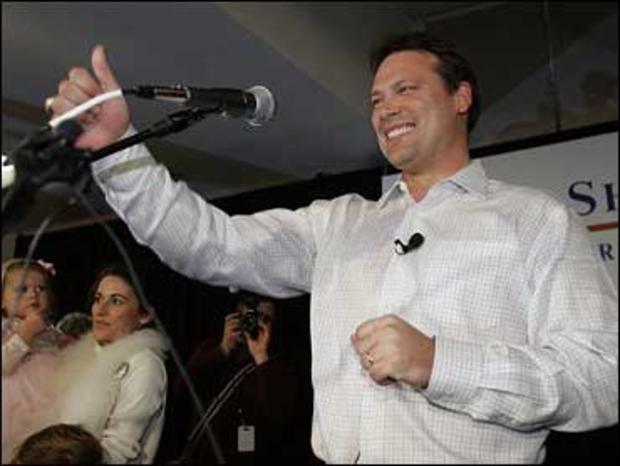Moderate Governance by the Next Congress? Fat Chance
In 2006 and 2008 the Democratic Party expanded - not just in the number of seats it controlled in Congress, but in how it won those seats. The Democrats won the majority by expanding the ideological definition of the Democratic Party itself.
The move was the brainchild of then-House Democratic Campaign boss Rahm Emanuel -- he envisioned a" big tent" Democratic Party and brought in a group of legislators who would have never before considered themselves Democrats. Take Heath Shuler (pictured), the former NFL star, who is fiscally conservative and opposed to abortion rights. He was recruited by Emanuel to run in 2006. Now he's in a tough re-election battle.
This year, the GOP is threatening its own expansion -- but only in numbers. The Republican Party is on the verge of a huge gain in the House, but primarily in districts now held by conservative Democrats who occupy seats normally won by Republicans. In fact, 49 Democrats serving in the current Congress are in seats won by John McCain in 2008.
So what does this mean? The Democrats won by firmly taking over the middle and even the middle-right of the map. Now, the GOP is taking over only the right and far right. So who will be gone? The people who lose their seats in Congress will be the moderate or conservative Democrats. They are the ones who won conservative districts in the past two elections and now will lose to even more conservative Republicans.
The electoral map after this election may be more representative of where the country truly is. But the GOP won't necessarily be controlling the middle because representation and true governance are different things. The liberal Democrats are safe and the conservative Republicans are safe. In the last few elections, the seats that changed control of the House were those in the middle, and now the GOP is moving the middle to the right.
After President Obama's 2008 election, most analysts saw a permanent sway in the electorate. But looking at the numbers, it wasn't a landslide at all. Mr. Obama won with nearly 67 million votes, some 53 percent of the electorate. That means that 58 million people, 46 percent of the voting population, voted for McCain and didn't want Mr. Obama to win.
Two years later, the independent voters who went to Obama have left the Democrats after the White House pursued an aggressive legislative agenda (much of achieved) but failed to quickly turn around the economy. So in this election, many of those middle ground voters will vote for the Republicans.
But this election has not been about the political middle -- it has been about the extremes. And with so many toss-up elections this year -- meaning many close races -- nearly half of the voters in many districts will have wanted the other guy.
So what does that mean after November 2? It means that neither party will be able to govern from the middle because there will be very few moderates left in the House, if any. Conservative candidates running against the Obama/Pelosi agenda are not promising to govern from the middle. The prognosis for moderate governing, after a year of such negativity and hyper-partisanship, is not promising.
Robert Hendin and Jill Jackson are CBS News Senior Political Producers. You can read more of Jill's posts in Hotsheet here or follow her on Twitter. More of Robert's posts in Hotsheet are here and you can follow him on Twitter here.

